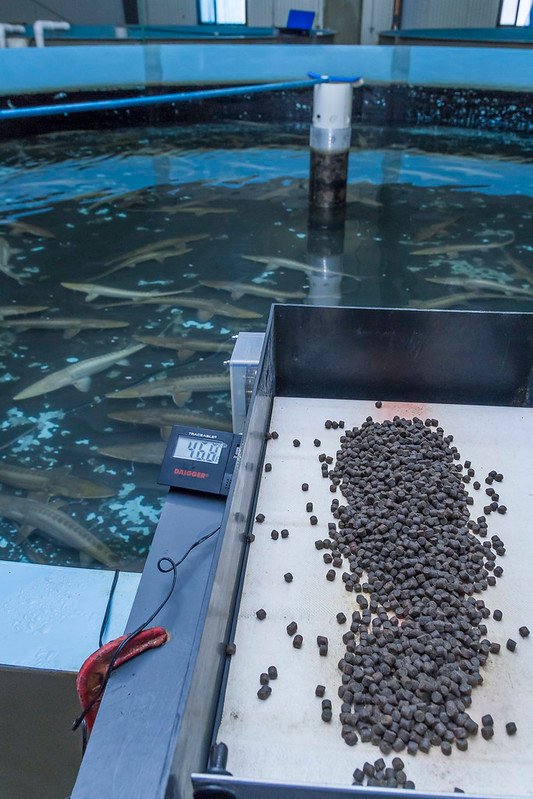
The future of aquaponics is within sight, and it involves artificial intelligence (AI). A new study published in the journal Computers and Electrical Engineering is gaining attention by integrating machine learning into this sustainable farming method. This innovative approach promises to optimize fish growth, improve resource efficiency, and pave the way for a more data-driven future for aquaponics.
Researchers from Qatar University, University of Doha for Science and Technology, University of Engineering & Technology, and Birzeit University present an innovative approach to aquaponics through the integration of artificial intelligence (AI). The system employs a novel machine learning approach to create a fully sustainable system that enhances fish nutrition and growth in aquaponic systems.
AI for a Thriving Ecosystem
Traditionally, aquaponics relies on balancing the needs of fish and plants within a single system. Nutrient-rich water from the fish tank nourishes the plants, while the plants filter the water for the fish. However, maintaining this delicate balance can be challenging. This study addresses this by using AI to predict fish growth based on various environmental parameters.
Machine learning, a branch of AI that allows computers to ‘learn’ from data, can further enhance the efficiency and sustainability of aquaponics. By analyzing data from various environmental parameters, machine learning algorithms can optimize nutrient cycles, predict plant and fish growth, and automate system management. This predictive ability allows for early detection of potential imbalances, ensuring a healthy and productive system.
The Power of Machine Learning
While aquaponics offers numerous benefits, one of the key challenges lies in understanding and managing the specific nutritional requirements of both plants and fish during the growing season. Previous studies have focused on general nutrient management practices, but a more nuanced approach is needed to optimize the growth and performance of plants and fish.
The study explores the use of machine learning. The researchers developed a system that analyzes several environmental parameters within the aquaponic system, including:
- pH levels
- Ammonia levels
- Nitrate levels
By analyzing this data, the system can predict the length and weight of the fish with remarkable accuracy. This allows aquaponic producers to:
- Tailor feeding strategies based on predicted growth patterns.
- Optimize water quality for optimal fish health and growth.
- Minimize waste through proactive management of nutrient levels.
Ensuring Precision and Transparency
The research goes beyond simply predicting fish growth. The team employed a technique called ‘LightGBM’ (Light Gradient Boosting Machine), a powerful machine learning model. To ensure its accuracy, they used a ‘five-step cross-validation’ method, which essentially tests the model on different data sets to confirm its generalization.
But the transparency doesn’t end there. The researchers implemented a novel approach called ‘LIME’ (Local Interpretable Model-Agnostic Explanations). This allows them to understand how individual factors (such as pH or ammonia levels) influence the model’s predictions. This transparency is crucial for building trust in the AI system and for further refinement.
Stay Always Informed
Join our communities to instantly receive the most important news, reports, and analysis from the aquaculture industry.
A Sustainable Future for Aquaponics
The findings of this study are significant because they demonstrate the potential of AI to revolutionize aquaponics practices. With accurate predictions of fish growth, producers can achieve:
- Higher fish production
- Reduced resource consumption (water, feed)
- Minimization of environmental impact
This research also paves the way for future applications. The framework can be adapted to different fish species by simply adjusting the parameters analyzed by the AI system.
Conclusion
The study has demonstrated the transformative potential of artificial intelligence (AI) to revolutionize the aquaponics industry. By leveraging advanced machine learning techniques, the researchers have developed a model that accurately predicts fish length and weight, paving the way for more efficient and sustainable fish farming practices.
Key Findings:
- Superior predictive accuracy: The LightGBM model, optimized through rigorous tuning, outperformed other machine learning algorithms in predicting fish growth.
- Enhanced transparency: The use of LIME for model interpretation provides valuable insights into the factors influencing predictions, fostering trust and understanding among stakeholders.
- Robustness and generalization: Successful external validation confirms the model’s reliability and applicability in different contexts.
- Potential for sustainable aquaculture: The proposed framework offers a promising solution for sustainable fish farming, particularly in resource-limited regions.
Building on the success of this study, future research can explore the integration of other AI-driven technologies, such as computer vision and robotics, to further automate and optimize aquaponic systems. Additionally, expanding the application of this framework to a broader range of fish species and environmental conditions may contribute to the wider adoption of sustainable aquaculture practices.
The study was funded by the Qatar National Research Fund (QNRF).
Contact
Amith Khandakar
Department of Electrical Engineering, College of Engineering, Qatar University
Doha 2713, Doha, Qatar
Email: amitk@qu.edu.qa
Reference (open access)
Khandakar, A., Elzein, I., Nahiduzzaman, M., Ayari, M. A., Ashraf, A. I., Korah, L., Zyoud, A., Ali, H., & Badawi, A. (2024). Smart aquaponics: An innovative machine learning framework for fish farming optimization. Computers and Electrical Engineering, 119, 109590. https://doi.org/10.1016/j.compeleceng.2024.109590
Editor at the digital magazine AquaHoy. He holds a degree in Aquaculture Biology from the National University of Santa (UNS) and a Master’s degree in Science and Innovation Management from the Polytechnic University of Valencia, with postgraduate diplomas in Business Innovation and Innovation Management. He possesses extensive experience in the aquaculture and fisheries sector, having led the Fisheries Innovation Unit of the National Program for Innovation in Fisheries and Aquaculture (PNIPA). He has served as a senior consultant in technology watch, an innovation project formulator and advisor, and a lecturer at UNS. He is a member of the Peruvian College of Biologists and was recognized by the World Aquaculture Society (WAS) in 2016 for his contribution to aquaculture.




